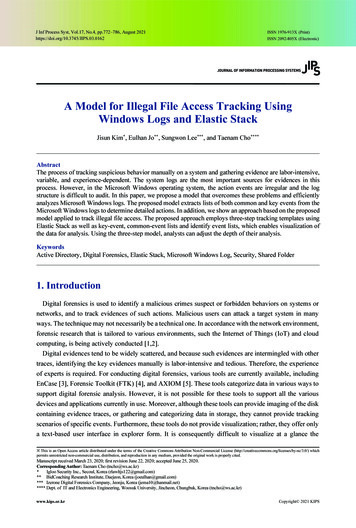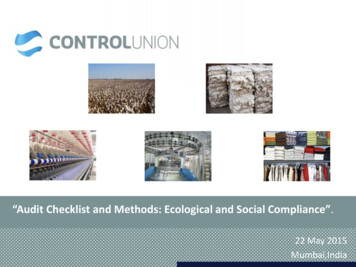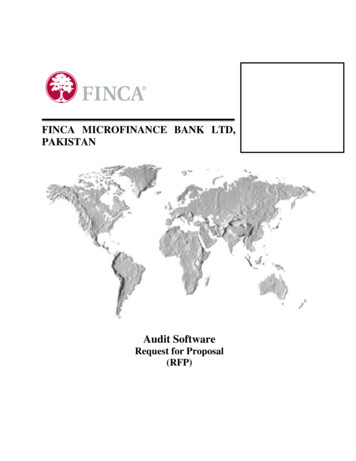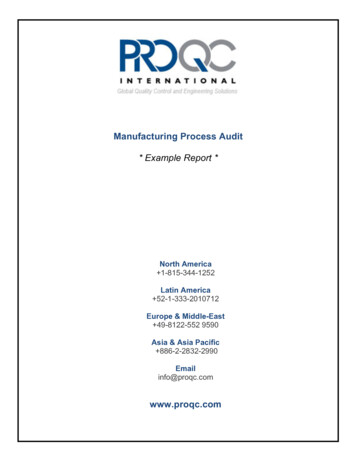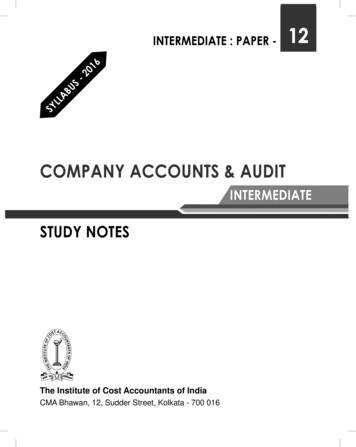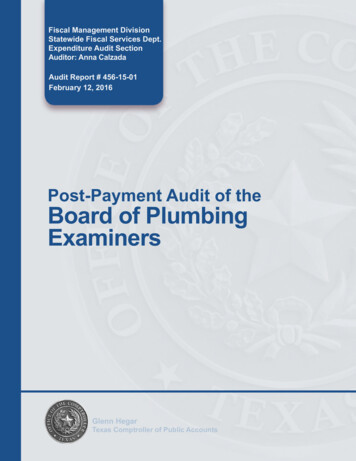
Transcription
Fiscal Management DivisionStatewide Fiscal Services Dept.Expenditure Audit SectionAuditor: Anna CalzadaAudit Report # 456-15-01February 12, 2016Post-Payment Audit of theBoard of PlumbingExaminersGlenn HegarTexas Comptroller of Public Accounts
Table of ContentsExecutive SummaryAudit scope. iPayroll transactions and payroll deductions. iPurchase/procurement transactions. iTravel transactions. iiInternal control structure. iiFixed assets. iiPrior post-payment audit and current audit recurring findings. iiDetailed Findings — PayrollIncorrect Longevity Payment Amount. 1Detailed Findings — Purchase/ProcurementPurchase Order Change Notice Processed After Invoice Received. 3Detailed Findings — Expenditure ApprovalsControl Weakness Over Expenditure Processing. 4
Executive SummaryAudit scopeWe audited a sample of the Board of Plumbing Examiners (Board) purchase and traveltransactions and all payroll transactions that processed through the Uniform StatewideAccounting System (USAS) and the Uniform Statewide Payroll/Personnel System (USPS)during the period beginning March 1, 2014, through Feb. 28, 2015, to determine compliancewith applicable state laws.The Board received appendices with the full reportthat included a list of the identified errors. Copiesof the appendices may be requested through aPublic Information Act inquiry.Texas law requires theTexas Comptroller of PublicAccounts (Comptroller’soffice) to audit claimssubmitted for paymentthrough the Comptroller’soffice. All paymenttransactions are subject toaudit regardless of amount ormateriality.The audit provides a reasonable basis for the findingsset forth in this report. The Board should implement therecommendations listed in the Detailed Findings of thisreport. It is the Board’s responsibility to seek refundsfor all overpayments unless it determines it is not costeffective to do so. If necessary, the Comptroller’s officemay take the actions set forth in Texas Government Code, Section 403.071(h), to ensurethat the Board’s documents comply in the future. The Board must ensure that the findingsdiscussed in this report are resolved.Payroll transactions and payroll deductionsPayroll transactions were audited for compliance with the General Appropriations Act (GAA),the Texas Payroll/Personnel Resource and other pertinent statutes.The audit identified: Incorrect longevity payment amount.A limited sample of voluntary contributions was also audited. No issues were identified.Purchase/procurement transactionsPurchase transactions were audited for compliance with the GAA, eXpendit, theState of Texas Procurement Manual and other pertinent statutes.The audit identified: Purchase order change notice processed after invoice received.Board of Plumbing Examiners (02-12-16)-Web – Page i
Executive SummaryTravel transactionsTravel transactions were audited for compliance with the GAA, Textravel and other pertinentstatutes. No issues were identified.Internal control structureThe Board’s internal control structure was reviewed. The review was limited to obtaining anunderstanding of the Board’s controls sufficient to plan the audit and did not include tests ofcontrol policies and procedures.The audit identified: One employee who can process and release payments through USAS.Fixed assetsThe audit included a review of a limited number of fixed assets acquired by expendituresduring our audit period to test for accurate reporting in the State Property Accounting (SPA)System and to verify existence of the assets. The disposed assets report listed two assets asmissing with a net book value of 511.18. All assets were in their intended location and properly tagged.Prior post-payment audit and current audit recurring findingsA prior post-payment audit of the Board’s payroll, purchase and travel transactions wasconcluded on Aug. 25, 2011.During the current audit, no recurring findings were identified.Contributing Auditor:Jesse Cantú, CPAContact:Anna Calzada512-463-4338Board of Plumbing Examiners (02-12-16)-Web – Page ii
Detailed Findings — PayrollIncorrect Longevity Payment AmountFindingIn our audit of payroll transactions we identified two employees with incorrect effectiveservice dates in USPS. This resulted in an underpayment amount of 2,580.00 in longevitypay for the two employees.The errors occurred because the prior state service listed on the employees’ applications wasnot verified or entered in USPS due to oversight.The proper calculation of the effective service date is derived by subtracting the total days oflifetime service credit from the most recent employment date. That date is used to determinewhen the longevity pay is to be increased.See Texas Payroll/Personnel Resource – Longevity Pay.We provided the Board with the schedule and calculations of the incorrect longevity paymentamounts during fieldwork. They are not included with this report due to e Board must ensure that prior state service is properly verified and documented for itsemployees. The Board must compensate the employees who were underpaid longevity pay.The Board must ensure that its internal operating procedures include quality control measuresthat will detect any underpayments of compensation to a state employee.Board ResponseWe agree with the findings and the two employees have been compensated for theirunderpaid longevity. We would like to point out that one of the two employees beganemployment with the Board in January 1996, several years before any of the currentAccounting staff began. This employee was previously audited several times by Comptrolleraudit staff but there was no finding.The second employee was hired in July 2000 and at that time the Board called the agency’sdesignated USPS analyst and informed them that this employee had prior state time and wasstill on staff with the University of Texas at Austin (UTA). The USPS analyst advised us thatbecause UTA was part of the UT System to not include the prior time. Back in 2000 this wasthe “usual” response for someone who had state time that was not not handled by USPS andthe Employees Retirement System of Texas, especially from colleges and other state systems.This employee was also previously audited several times by Comptroller audit staff but therewas no finding.Board of Plumbing Examiners (02-12-16)-Web – Page 1
Detailed Findings — PayrollComptroller ResponseOfficers and state employees are responsible for being knowledgeable about state and federallaws and rules concerning payroll expenditures and other human resources actions. Inaddition, officers and state employees must ensure the agency’s payroll expenditures complywith the state and federal laws and rules. A state agency is responsible for ensuring that allpayments that are processed through the Comptroller’s systems are correct. A mistake madeby a state agency in calculating an item involving compensation does not absolve the officeror employee of the responsibility. Each voucher must stand on its own. An improper type ofpayment is not made proper by the fact that it is made one or more times.Board of Plumbing Examiners (02-12-16)-Web – Page 2
Detailed Findings — Purchase/ProcurementPurchase Order Change Notice Processed After Invoice ReceivedFindingWe identified one transaction where the purchase order (PO) was changed to increase theamount after the invoice was received. The Board said the error occurred due to oversight.The Board’s procedures are to initiate the Purchase Order Change Notice (POCN) processto document changes before ordering the goods and/or services. In this instance, the Board’sprocedures were not followed.Without a completed POCN prior to receiving the invoice, it becomes difficult for the Boardto ensure it was not overcharged or billed for goods or services beyond those the Boardagreed to purchase.Recommendation/RequirementThe Board should document any changes to the original PO, including signatures and dates,through the POCN process prior to the vendor performing the services or providing thegoods.Board ResponseWe agree with this finding. However, for this particular purchase, a piece of equipment wasordered in August 2013. Several months after placing the order we were notified that theexisting product had been discontinued and several months passed before a replacement unitwas agreed upon. The replacement piece of equipment offered was larger than the originalone ordered, and when delivery was attempted, would not fit through the door where it wasto be placed and needed to be disassembled. The additional amount added to the invoice wasfor the reassembly and installation charges that could not be determined when the originalorder was placed due to the size of the available equipment.Comptroller ResponseIn this instance, the Board should have contacted the TXMAS (Texas multiple awardschedule) contractor prior to issuing the purchase order to negotiate any installation, insidedelivery or set-up fees. After a review of the original product order specifications and areview of the replacement product order specifications, it was determined that the dimensionswere the same.Board of Plumbing Examiners (02-12-16)-Web – Page 3
Detailed Findings — Expenditure ApprovalsControl Weakness Over Expenditure ProcessingFindingAs part of our planning process for the post-payment audit, we reviewed certain limitationsthat the Board placed on its accounting staff members’ abilities to process expenditures.We reviewed the Board’s security in USAS, USPS, the Texas Identification Number System(TINS) and voucher signature cards that were in effect on April 15, 2015. We did not reviewor test any internal or compensating controls that the Board may have relating to USAS,USPS or TINS security or internal transaction approvals.During the audit, we identified one employee who could process and release paymentsthrough USAS without electronic oversight. The Board was provided with a schedule of thisfinding during fieldwork.We ran a report to determine whether any of the Board’s payment documents processedthrough USAS or USPS during the audit period because of the action of only one person.There were no payments in USAS or USPS that processed because of the action of oneemployee.To reduce risks to state funds, agencies should have controls over expenditure processing thatsegregate each accounting task to the greatest extent practicable. Ideally, no individual shouldbe able to process transactions without another person’s involvement.Recommendation/RequirementThe Board should periodically review the controls over expenditure processing and segregateeach task to the extent possible to ensure that no individual is able to process paymentswithout oversight.Board ResponseSince there are only two persons in the Accounting section of the agency, separation of dutiesis very difficult, as is the case with all small agencies. This issue has come up in the priorComptroller expenditure audits of 2004, 2007 and 2011. Although the Board has followed allprevious recommendations that have been suggested by Comptroller staff, the issue remainsand continues to be an audit finding. Previous recommendations have included removingthe Director of Financial Operations from being able to pick up or sign for warrants andrequiring him to access USAS by using five different user class codes for specific documenttypes (rather than just one). Security sets for USAS were obviously developed for largeragencies with multiple accounting personnel, but the Board has been unable to obtain asatisfactory remedy from Comptroller staff regarding this issue. It is the Board’s hope thatthe upcoming new CAPPS Accounting System will provide a better solution in this area forsmaller State agencies.Board of Plumbing Examiners (02-12-16)-Web – Page 4
Detailed Findings — Expenditure ApprovalsComptroller ResponseThe Board should consider segregating duties so that the employee who has access to enter orchange vouchers in the system does not also have access to approve or release payments. TheBoard should request that a preventive control be enforced for all of its transactions in USAS.If the Board requests the control, an edit will prevent the release of a document that the sameuser entered or altered. See USAS Accounting and Payment Control (FPP B.005) whichexplains how agencies can strengthen internal controls and reduce risk to state funds.Board of Plumbing Examiners (02-12-16)-Web – Page 5
Board of Plumbing Examiners (02-12-16)-Web - Page 2 Comptroller Response . In this instance, the Board should have contacted the TXMAS (Texas multiple award schedule) contractor prior to issuing the purchase order to negotiate any installation, inside delivery or set-up fees. After a review of the original product order specifications and a

